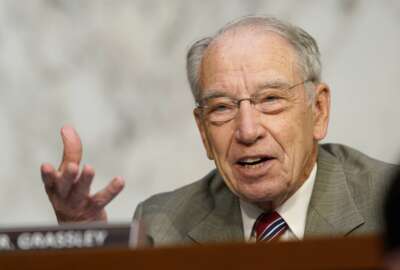The Federal Headlines is a daily compilation of the stories you hear discussed on Federal Drive with Tom Temin.
- Democratic Presidential nominee Hilary Clinton is tapping well-known executives to lead her transition team. Clinton named former Interior Secretary and Colorado Senator Ken Salazar to be the chairman of the White House transition team. She also called on former National Security Advisor Tom Donilon to President Barack Obama to be on the team. Along with Salazar and Donilon, former Michigan Governor Jennifer Granholm and two longtime Clinton advisers: Neera Tanden, the president of the Center for American Progress, and Maggie Williams, who now leads the Institute of Politics at Harvard University, are part of the transition team. (Federal News Radio)
- Ninety federal employees have applied for phased retirement with the Office of Personnel Management. It’s well up from the 30 or so federal employees who applied as of January. But some federal employee organizations say phased retirement implementation at agencies is just too slow. It’s been four years since Congress signed off on the program, and two years since OPM put out final regulations. NASA and the EPA have the most number of phased retirees so far. (Federal News Radio)
- The two IT companies who hired Washington Navy Yard mass shooter Aaron Alexis urge a judge dismiss the lawsuit against them brought by the victims’ families. The National Law Journal reports attorneys for HP Enterprise Services and The Experts who HP subcontracted say there is no way they could’ve foreseen Alexis’ actions. The plaintiffs maintain that prior incidents showed he might harm others. (National Law Journal)
Will the upcoming presidential transition impact your decision to retire? Take our online survey.
- The Department of Energy looks to improve the security of the nation’s energy critical infrastructure. DOE awards $34 million in funding for 12 programs hoping to improve the power grid’s cybersecurity. Pending Congressional approval, the projects will focus on detecting and reducing exposure to cyber threats. The awardees include General Electric, Intel Federal, and Iowa and Texas A&M University. (Department of Energy)
- No federal agency, even the most secretive,may be safe from cyber attacks. The National Security Agency has apparently been hacked. Several news sites report the hacker group Shadow Brokers posted code that appeared to be taken from top-secret NSA systems. The code is used to infiltrate networks of foreign governments. The New York Times reports, cybersecurity experts shown the code confirm its origins. They say the code does *not* come from materials taken by Edward Snowden. (New York Times)
- NASA wants the public to have more access to scientific publications and digital data which comes from the research it funds. It enacts a new policy requiring researchers who work for or with the space agency to include how they plan to increase public access in funding proposals. They’ll also have to submit data and publications to its online public database. (NASA)
- A huge surge in the use of challenges across the government. More agencies over the past year are using the challenge.gov platform to run competitions. And these agencies are getting more creative too. The Office of Science and Technology Policy issued its fiscal 2015 report on the use of prizes and competitions. In it, OSTP says more than 700 challenges from more than 100 agencies were listed on the site. Between 2010 and 2015, 72 agencies held 396 challenges. Agencies used a majority of the challenges in 2015 to solve a specific problem or develop technology. The Energy Department and the Defense Advanced Research Projects Agency handed out the largest dollar prizes of $10 million and $6.6 million respectively. (DigitalGov)
- As things stand now, the Army’s Enterprise Service Desk — meant to be the single point of contact for users with IT troubles — only solves one out of ten cases on the first phone call. Officials know they have to do better than that, and that the call volume will jump dramatically during the Windows 10 transition. The Army says it’s trying to get ahead of the problem, including by directing certain calls to some of its more experienced signal commands, and publishing more self-help guides to let users solve problems on their own before dialing tech support. (Federal News Radio)
- The 500,000th veteran volunteers to enroll in Veterans Affairs’ Million Veteran Program. And with that, they say only 500,000 more to go, urging more veterans to sign up. The research database program aims to build one of the world’s largest medical databases to study the role genetics play in overall health. (Department of Veterans Affairs)
Copyright
© 2024 Federal News Network. All rights reserved. This website is not intended for users located within the European Economic Area.





